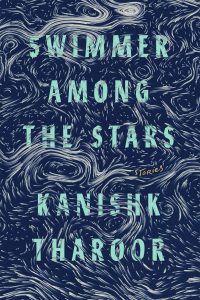
 In his genre-spanning oeuvre as a writer, journalist and critic, Kanishk Tharoor is occupied with dustsceawung, an Old English word that roughly translates to “the contemplation of dust.”
In his genre-spanning oeuvre as a writer, journalist and critic, Kanishk Tharoor is occupied with dustsceawung, an Old English word that roughly translates to “the contemplation of dust.”
“Its closest equivalent may be ‘nostalgia,’ but that’s too backward facing,” Tharoor said. “Dustsceawung acknowledges that the past persists into the present even if just as debris. I think both my short stories and my radio work are animated by the ethos of that ancient Anglo-Saxon word.”
The host of “Museum of Lost Objects” — a BBC radio series that details the histories of Iraqi, Syrian, Indian and Pakistani treasures that have been looted or destroyed — and the author of Swimmer Among the Stars, Week Eight’s Chautauqua Literary and Scientific Circle selection — a short story collection encompassing a trans-oceanic elephant crossing and the songs of the last speaker of a language — Tharoor described himself as “interested in what people choose to remember of their past, and what they choose to forget.”
For his CLSC Author Presentation at 3:30 p.m. Thursday, August 15 in the Hall of Philosophy, Tharoor will speak on the way in which an “awareness of … how kingdoms, countries, cities can decline, how power can flee a place that once imagined itself as glorious and mighty” informs Swimmer Among the Stars. Such a position is especially significant now, Tharoor noted, as power shifts away from the West, leaving those inhabiting that part of the world to discover the necessity of “(assimilating) the histories and perspectives of others into their own worldview.”
Although Atom Atkinson, director of literary arts, allowed that a book of reportage on international politics or history might be the more obvious choice for Week Eight’s “Shifting Global Power” theme, they praised Tharoor’s debut as “a series of brief fictional encounters with both of those things.”
“(Swimmer Among the Stars) is an imaginative exploration of the way that (international politics and history) can intervene in our daily lives and personal relationships in ways that can feel magical, that can mean certain doom, that can unveil the sublime stupidity of bureaucracy — which is an especially interesting thematic register for the son of former undersecretary general of the United Nations, (Shashi Tharoor),” they said.
Writing since he was 9 years old, Tharoor now has bylines in The New York Times, The Atlantic, The Nation, The Paris Review and The New Yorker. He wrote the stories inside his collection over the course of a decade — “Tale of the Teahouse,” Swimmer’s second story, was first published in the summer 2008 issue of Virginia Quarterly Review and was nominated for a National Magazine Award.
However, he’s “particularly fond” of “The Mirrors of Iskandar,” a kind of collection within the collection. A series of vignettes, the short pieces build on legendary accounts of Alexander the Great, a “cycle of stories” that transcended language and borders in the Middle Ages. As the king of Tharoor’s prose — named Iskander after early depictions of Alexander as a Muslim hero — marauds his way from China to the open sea, he enslaves fairies and survives the Land of Darkness.
A quote from Italo Calvino’s Invisible Cities — in which a traveler, upon arriving at a new city, “finds again a past of his that he did not know he had” — serves as both the epigraph and emotional map for the journeys, including Iskander’s, within Swimmer Among the Stars. Tharoor was a teen when he first read Calvino’s 1972 novel, which is framed as a conversation between Marco Polo and Kublai Khan, and still remembers the astonishment that followed his young encounter with the text.
“The possibilities of fiction seemed immense to me, and few books have given me that feeling of wonder,” he said. “The quote speaks to the experience of travel and encountering the ‘other,’ how it’s not so straightforward, how we bring ourselves and our own experiences to the world outside, how the journey outwards can be a journey inwards. That’s all part of the spirit of my stories.”
Moving forward, Tharoor will continue to work on two books-in-progress, as well as prepare for the most recent installment of “Museum of Lost Objects,” forthcoming in late August. He has also started a new job as senior editor of Foreign Affairs, an American magazine of international relations and U.S. foreign policy published by the Council on Foreign Relations.
“I’m looking forward to helping shape the conversation around the United States’ role in the world,” Tharoor said. “And most importantly, I’m having lots of fun wrangling my 1 1/2-year-old son … who has re-enchanted the world for me, and with whom I experience its wonders every day.”




